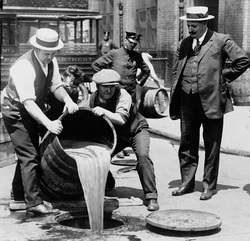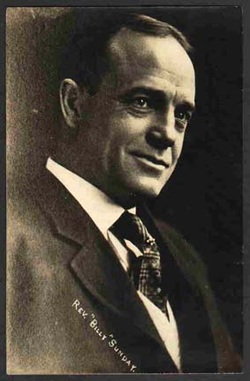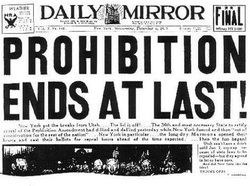Prohibition

Before the 1920s the 18th Amendment was passed prohibiting the manufacture and sale of alcohol like liquor, wine, and beer. This lead to many controversial feelings that were expressed during this time period. Soon after the 18th Amendment was the passed, Congress decided to pass the Volstead Act which enforced the 18th Amendment. Even though an amendment was passed prohibiting alcohol, people did not stop drinking alcohol whether it was publicly or privately. Instead people went to bars and clubs called speakeasies, which sold smuggled liquor known as bootleg liquor. This bootlegged alcohol was coming from all sorts of locations such as people garages and Canada. Gangs were associated with the sale of bootleg alcohol that allowed them to make millions and expand. Not only did the people not respect the amendment, but law enforcers did not agree as well. An example is when city police were paid to look the other way. Even President Warren Harding disobeyed the law and served alcohol to his guests. It also gave younger people a change to disobey the law because they felt they were restrained.
Billy Sunday

Billy Sunday, a former baseball player, disagreed with the government trying to tax and regulate alcohol by passing the 18th Amendment. He thought is was immoral. He thought that the sale of alcohol in private hands led to many people being able to get their hands on alcohol whenever they wanted. He thought that America could deal without the prohibition law because they would not spend millions on alcohol but necessities like clothing and an education.
"I don’t give a hoot for the regulation of the sale of liquor. If we must have booze, well let’s sell it in a saloon where it belongs."
"Oh, America didn’t need repeal, she needed repentance! She didn’t need wrong, she needed righteousness! We don’t need Jags, we need Jesus! We don’t need more grog, we need more God!"
"I don’t give a hoot for the regulation of the sale of liquor. If we must have booze, well let’s sell it in a saloon where it belongs."
"Oh, America didn’t need repeal, she needed repentance! She didn’t need wrong, she needed righteousness! We don’t need Jags, we need Jesus! We don’t need more grog, we need more God!"
Repeal of the 18th Amendment

Throughout the government there was mixed feelings on prohibition. The Republicans supported prohibition, however would drink alcohol privately. The democrats were divided. The southern democrats supported prohibition while northern democrats wanted to repeal it. Despite the decline in alcoholism and alcohol related deaths, there was an increase in criminal activity. These arguments went all the way into the next decade causing the 21st Amendment to be passed in 1933.
